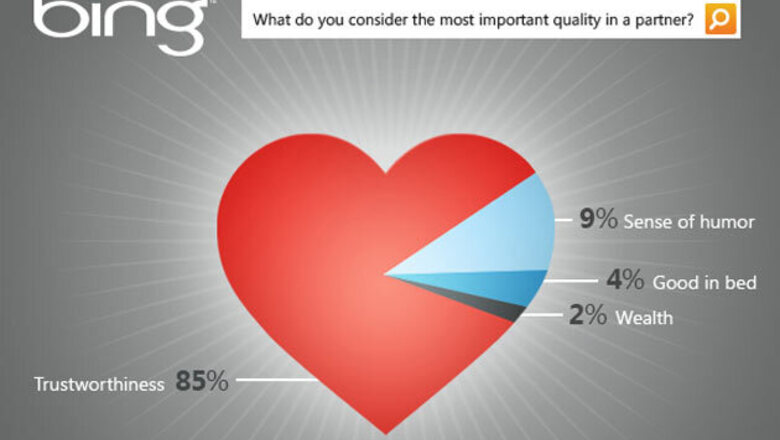
views
New Delhi: Internet users' love affair with Google has been going strong for long and Microsoft has been desperately wanting to break the bond. This Valentine's Day Microsoft wants you to dump 'untrustworthy' Google and run to its Bing search engine's outstretched arms.
Microsoft cites a survey which says one in 10 people have ended a relationship on February 14 and the same report states that 85 per cent of people rank trustworthiness as the most important trait in a mate, beating out good in bed, sense of humour and wealth.
"You wouldn't keep dating someone who isn't trustworthy, so why use a search engine known for serving its interests over your own?," asserts Microsoft in its press release.
Microsoft says Google isn't being fair with users in its relationship with them. "Google Shopping displays ads only from merchants that pay for ranking. Bing offers honest results so you get the best deals from across the Web."
In November 2012 Microsoft had initiated a campaign that tried to skewer Google as a lousy holiday shopping guide. The Microsoft marketing campaign focused on a change in the way Google operates the part of its search engine devoted to shopping results. The revisions requires merchants to pay Google to have their products listed in Google's shopping section.
The barbs are injecting more antagonism into an already bitter rivalry between two of the world's best-known and most powerful technology companies.
Google's search engine is dominant on the Internet, and Bing runs a distant second. Microsoft's Office and Windows software remains an integral part of personal computers, but Google has been reducing the importance of those programs and PCs with the success of Web-based services and its Android operating system for smartphones and tablet computers.
According to the latest data from StatCounter, Google leads the search engine market with a whopping 90.47 per cent in January 2013, while Bing managed to rake in only 3.33 per cent.
Google doesn't require websites to pay to be listed in its main database, the index that provides results for requests entered into its all-purpose search box. A query made there for a particular product, such as a computer, will still include results from merchants who haven't paid for the privilege of being included.
But that's not the case for someone who clicks on a tab to enter Google's shopping-only section, which is designed to compare prices and offer other insights such as identifying sites that offer free shipping. Searches there are confined to paying merchants. That means results from sites, including Web retailing giant Amazon.com, aren't displayed unless they pay. Amazon has only occasionally paid to have some of its wares listed in Google's shopping section. Zappos, a site owned by Amazon, has been more willing to pay the price to be listed in Google's shopping results.
Google defends the fee-based approach as a way to encourage merchants to provide more comprehensive and accurate information about what they're selling.
(With inputs from AP)



















Comments
0 comment